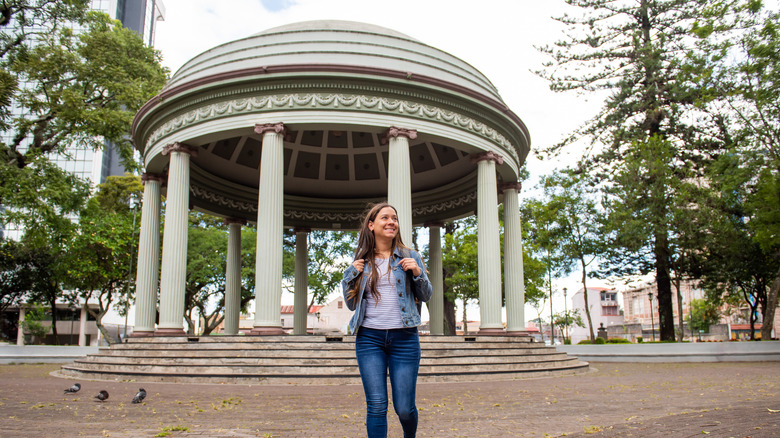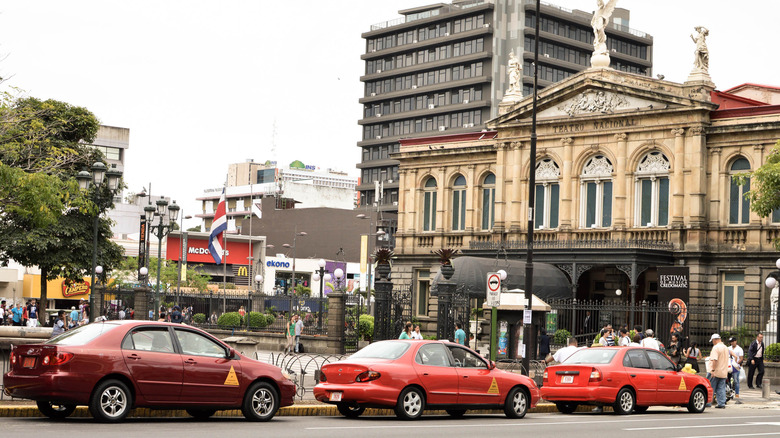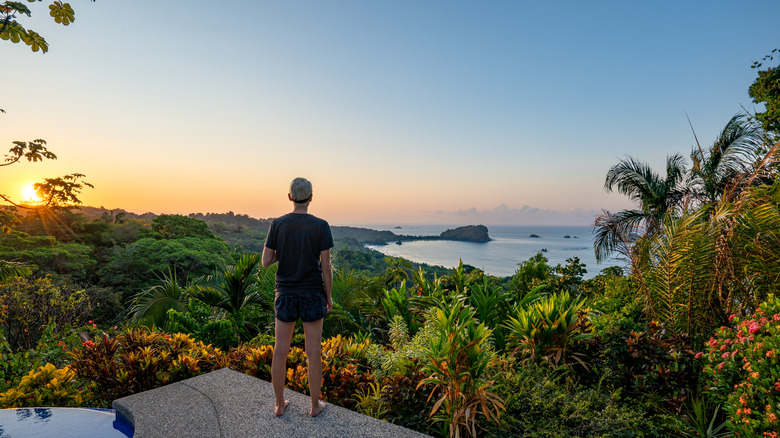The Unexpected Reason Costa Rica Is Known To Be So Difficult For Tourists To Navigate
Costa Rica is widely considered one of the easiest places in Latin America for tourists to visit. It's the perfect international destination for travel newbies, solo travelers, and digital nomads. The tiny country sits between Nicaragua and Panama and is bordered by the Pacific Ocean and the Caribbean Sea, and it's pretty much set up for tourism. International travelers love the country for its natural beauty, unique wildlife, friendly locals, and because it's one of the safest countries in Latin America. In almost every way, Costa Rica makes for the perfect laid-back vacation experience.
Many Costa Ricans speak both Spanish and English, so communication is easy. There are public buses, tourist shuttles, and domestic flights that make getting around a breeze. Finding epic activities to fill your days is no problem due to the abundance of exciting tour offerings all over the country. Costa Rica is paradise for all types of travelers whether you long to stay at a luxury resort and spend all day lounging on the gorgeous beaches, hike to volcanoes, learn to surf, or immerse yourself in the biodiversity of the country's lush rainforests.
While you'll likely find yourself feeling quite comfortable during your trip to Costa Rica, you may be surprised when you arrive to discover that navigating is quite different. The country doesn't have street addresses, which can be quite confusing for tourists. Instead of typing in an address, you'll have to use local landmarks and rely on the firsthand knowledge of locals to get around.
The absence of a standardized address system
I spent a large part of my childhood living just outside of a small town called Puerto Jimenez on Costa Rica's remote Osa Peninsula. Our home was off-the-grid and, before cellphones, we used a marine radio as the only means of communication with our community. I loved calling for a taxi pick-up on the radio. "Taxi, taxi, taxi," I'd say into the microphone, followed by "Finca Guanabana!" About 30 minutes later I'd hear the sound of a taxi barreling down our long dirt driveway. As I grew older, I realized that Finca Guanabana was the closest thing we had to an address. It translates to "Guanabana Farm" and even though our property hasn't been a working farm in at least 40 years, everyone in town still knows it by that name. Now we use cellphones to call for taxis, but the pick-up address remains the same.
Throughout the country, mail is sent and received via written directions and proximities to local landmarks. The address to your Airbnb might be, "150 meters in front of the church" and sometimes locals use landmarks that no longer exist. It's a good idea to get comfortable asking for directions as you travel around the country. Costa Rica's system may seem confusing, outdated, and downright chaotic to some, but there's also something really beautiful about learning your way around a new place using landmarks instead of a smartphone. It's a system that relies on community and connection.
Embracing the Pura Vida lifestyle
People who grew up in small towns might not experience total culture shock when navigating rural Costa Rica, but visiting San Jose, a top destination for solo travelers, is a whole other animal. The streets downtown do have names, but locals still use landmarks to navigate the bustling and vibrant city.
If you're staying at a hotel, you can usually just type the hotel name into GPS. If you're hoping to receive mail, you should ask the front desk for information, or have the post office hold it for you. Taxi and Uber drivers know the city super well. As long as you know the name of the place you are going, or perhaps a landmark nearby, you should be good to go.
Navigating a country without a centralized address system requires that you get to know the world around you, pay attention to small details, and stay present. There's something special about hopping in a taxi and saying, "Please take me to the house with the green roof and the big tree out front, about 3 kilometers from the beach," and realizing that the driver understands exactly how to get you home. It's a remnant of an agrarian way of life that has been forgotten in most parts of the world, when everyone knew their neighbors by name. Instead of feeling frustrated getting around Costa Rica, consider it a one-of-a-kind travel experience you won't find elsewhere, exemplifying the Pura Vida lifestyle.


